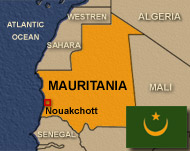Mauritania coup leader pleads guilty
The ringleader of a string of purported plots to overthrow the Mauritanian government has pleaded guilty to mounting an attempt to oust President Muawiya Walad Taya.

“I wanted to change a rotten and illegal regime by way of a coup d’etat, similar to that launched on 12 December 1984 by Walad Taya,” Major Salih Walad Hananna said in testimony in Wad Naga, 50km east of the capital Nouakchott.
Hananna denied charges that he had taken arms against his country and of having led a seditious movement.
Hearings at what is likely to be the largest-ever trial in the massive northwest African country resumed on Tuesday after being suspended for technical and practical reasons for eight days by presiding justice Muhammad al-Hadi Walad Muhammad.
A mixed civilian and military jury is hearing the charges of armed attempts to destroy and change the constitutional regime levelled against 191 suspects, among them former president Muhammad Khuna Walad Haid Allah and prominent opposition leaders Ahmad Walad Dadda and Shaikh Walad Hurma.
Hananna, who along with several other defendants went on a hunger strike in November to demand better treatment in prison, was the first of 132 suspects to appear in court to plead guilty to the charges, which carry the death penalty.
Plots foiled
The plots began with an army uprising in June 2003, which was put down by loyalist troops after a 36-hour battle in Nouakchott.
|
“We received material support from numerous Mauritanian citizens – students, civil servants and others who back and find hope in our efforts” Major Salih Walad Hananna |
The authorities said they also foiled plots in August and September of this year, including one that threatened a wide-scale massacre and anarchy once the insurgents seized the capital.
Hananna told the court on Tuesday that the plots were legitimised by the “disastrous economic, social and political situation” in the country of 2.7 million, among the world’s poorest.
Mauritania also bore the brunt of this year’s invasion by swarms of desert locusts, the worst in more than a decade.
The government has accused Libya and Burkina Faso of instigating the coup plots, pointing to seized weapons, vehicles and other equipment that are clearly identifiable as having come from Libya.
Hananna denied having received financial assistance from Tripoli and Ouagadougou but said he had travelled several times with a false passport to both Burkina Faso and eastern neighbour Mali.
Opponents banished
“We received material support from numerous Mauritanian citizens – students, civil servants and others who back and find hope in our efforts,” he told the court.
 |
|
Mauritania has pursued a pro- |
Mauritania established relations with Israel in 1999, one of only three Arab League countries to have done so.
Walad Taya has also moved to strengthen ties with the United States, offering Mauritania as a base for a major military programme known as the Pan-Sahel initiative which stretches across northwest Africa.
US oil conglomerates such as Halliburton, formerly run by Vice- President Dick Cheney, have also made substantial investments in the country’s budding oil industry.
Critics of Walad Taya’s government say that in foiling the alleged coup plots, the authorities are able to round up and banish the political opposition, in particular the Islamic activists who are gaining ground among the country’s 2.7 million people.
Walad Taya has ruled Mauritania since 1984, maintaining his power in elections in 1992, 1997 and in 2003.